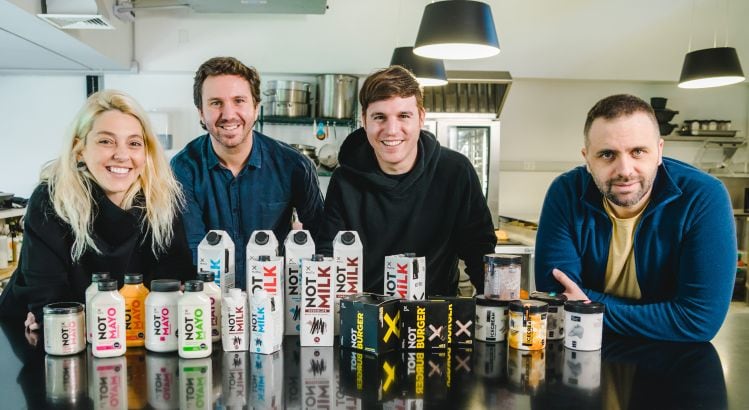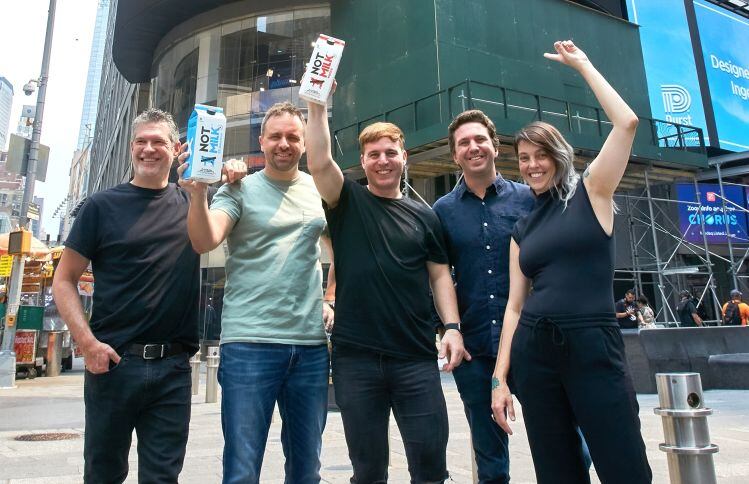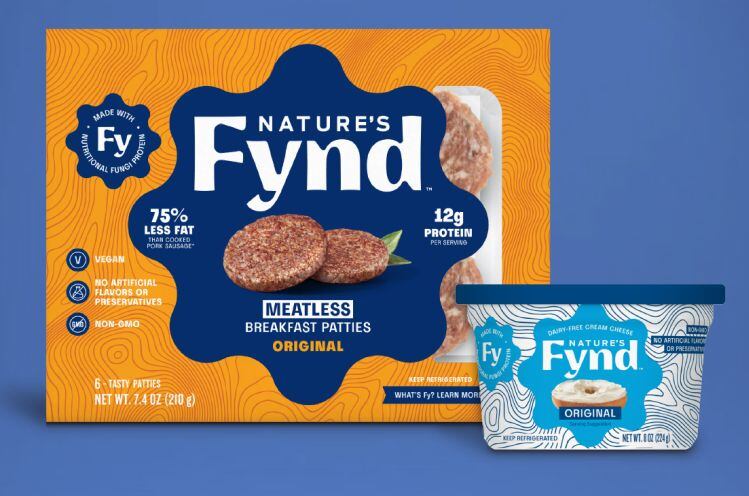The brand, which launched five years ago and now operates in five countries in retail and foodservice, was recently granted a first-of-its kind US patent for its AI technology (‘Giuseppe’), which it claims gives it an edge in the race to reverse engineer animal foods and put them back together - molecule by molecule - with plants, creating next-generation meat, egg, and dairy alternatives.
Founder and CEO, Matias Muchnick said the new funding would support NotCo’s expansion into new categories in North America (it entered the US market seven months ago with NotMilk and is on track to reach 8,000 doors by the year end), scale its AI technology, and accelerate plans to launch in Europe and Asia.
Billed as the ‘Impossible Foods/Beyond Meat of Latin America’ (NotCo's plant-based RebelWhopper is sold at Burger King and Papa John’s in Chile with more countries to follow soon), NotCosells plant-based milk, burgers, mayo, and ice cream in major retailers and QSR chains in Chile, Argentina, Brazil, and Colombia; and is planning to move into Mexico and Canada this year, before moving into European and Asian markets at a later date, said Muchnick, who recently moved from Chile to New York to spearhead the company’s US expansion.
Asked what products might be next in the US, he told FoodNavigator-USA: "We are actively looking at all major animal-protein categories, with a focus on categories that have already successfully launched in other markets. For example, NotBurger and the recently launched NotMeat in Latin America.
"We’re also looking at new categories where consumers have yet to see a plant-based substitute that can replicate the taste and feel of animal-based products without the compromises that exist in the market today."
Reverse engineering
Like Impossible Foods, Beyond Meat, and new player Climax Foods, NotCo says its strategy is to make affordable meat and dairy analogs that mimic their animal-based counterparts so precisely that consumers are not required to compromise… at which point, it says, the question becomes not why would you buy its products, but why wouldn’t you?
And only then will ‘alternative’ products start to seriously displace foods made from industrialized animal agriculture, argued Muchnick, who said significant strides have been made with plant-based meat, but that many plant-based dairy products – notably cheese, yogurt, and milk – still don’t deliver the taste, experience, and functionality that consumers get from dairy products.
NotMilk is distinct in the plant-based milk space in that it is designed to replicate the taste and functionality of dairy milk, whereas other brands typically highlight their core ingredient (oats, almond) and are not necessarily trying to mimic cow's milk, he said.
"NotMilk is the first plant-based milk that actually replicates the taste, feel and function of dairy almost to perfection. Consumers are looking for products that offer them the same experience they are used to, without the compromise on taste."
There are also huge opportunities in other plant-based dairy categories for products that more precisely mimic animal products, he said: “There is a huge opportunity there, especially in cheese. We are absolutely obsessed with cheese and we really think we can crack that better than anyone in this space.”
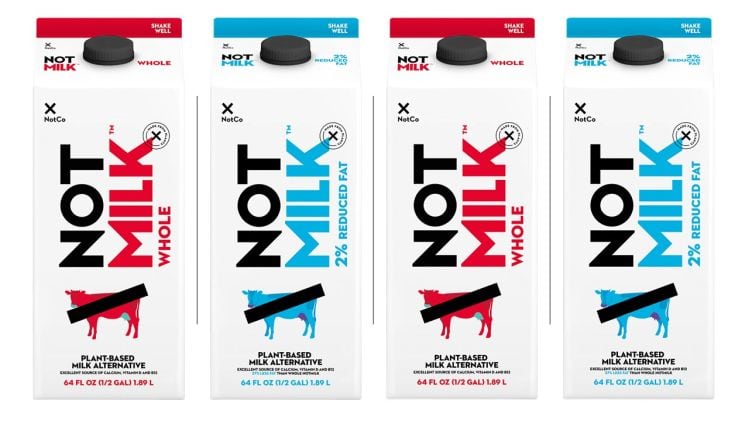
Beyond flavor pairing… Meet Giuseppe
Which is where Giuseppe – the name given to NotCo’s artificial intelligence – comes in.
“We try to understand in a very profound way what animal products are; not just the molecular information, the composition of the protein, but every dimension of the product, the spectral information, the physiochemical composition, the sensory information,” explained Muchnick in a recent interview.
Giuseppe is tasked with recreating this experience with plants, crawling through vast datasets (from internet recipes to USDA’s National Agricultural Library, to databases storing FTIR, gas chromatography, texturometer, physiochemical/viscosity/pH info) to make connections that “are not logical for humans.”
To cynics that say every aspiring food company now adds terms such as 'machine learning' or 'AI' to its pitch deck to secure a tech valuation for what is basically a food company, Muchnick argued that Giuseppe's capabilities go way beyond flavor pairing (using science rather than a chef’s intuition to determine, say, that pineapple and blue cheese would be a great flavor combo as they both contain methyl hexanoate, for example).
NotMilk, for example, features pineapple and cabbage, two ingredients you wouldn’t expect to see in a plant-based milk, which Giuseppe identified as a combination that would generate lactones, aroma compounds found in dairy products. But Giuseppe is also tasked with finding ingredients and processes that deliver foaming, emulsification and other technical properties that make NotMilk deliver from a functional and sensory perspective, he claimed.
“It’s not just recipe generation; cooking processes are super important, so the algorithm needed to understand the impact of processing, which can generates new things like volatiles that you might not get from the ingredient in raw form but you get with heat, so we needed to train it to understand how ingredients work in combinations and in processes.”
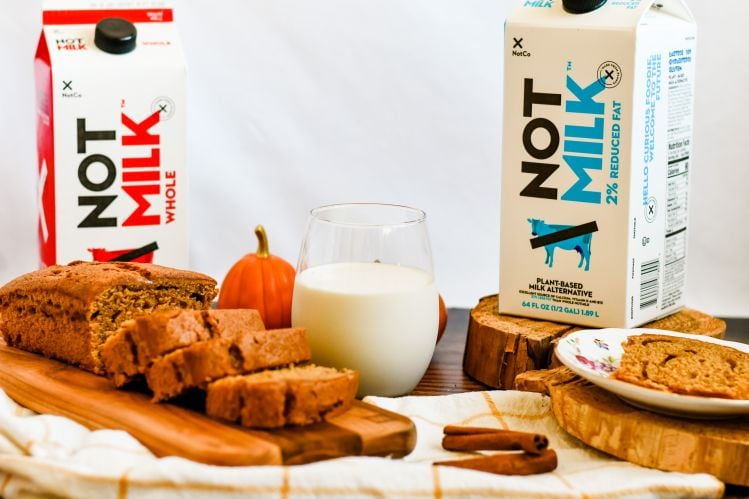
Artificial intelligence: It’s not just about discovery
While a team of enterprising chefs with a limitless supply of ingredients to work with might have stumbled upon the NotCo formula through trial and error, Giuseppe is much more systematic, and doesn’t approach a task with any pre-conceived ideas, said Muchnick.
Going beyond discovery and initial formulation, Giuseppe can also adapt to change, he said, citing the example of a switch in pea protein suppliers.
“They all taste slightly different because the isolation of the protein is different and so on, and NotCo can help you balance formulations when there is variable change, so it not just about discovery, it’s way more robust than that.”
He added: “We’re not the only ones using AI to solve problems in the food industry, but this gives us the ability to create plant-based products faster, better, and more accurate, than anyone else in this space.”
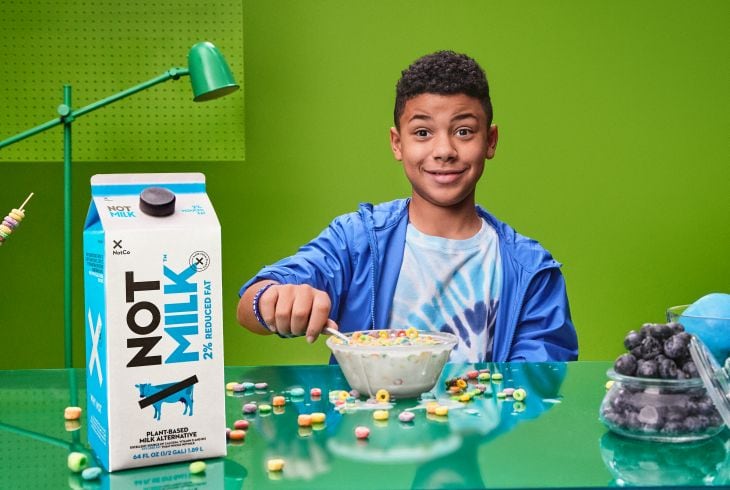
NotMilk 2% ingredients: Water, pea protein, chicory root fiber, pineapple juice concentrate, coconut oil, sunflower oil, virgin coconut oil, cabbage juice concentrate, natural flavors, salt, gum acacia, gellan gum, calcium carbonate, monocalcium phosphate, dipotassium phosphate, vitamin B12, vitamin D2.
Nutrition: A 240ml serving of NotMilk 2% contains 4g protein, 3g fiber, 3g sugar and 90 calories. (By comparison, a 240 ml serving of 2% dairy milk from Lucerne Farms contains 10g protein, 0g fiber, 14g sugar, and 140 calories.) Pic credit: NotCo
